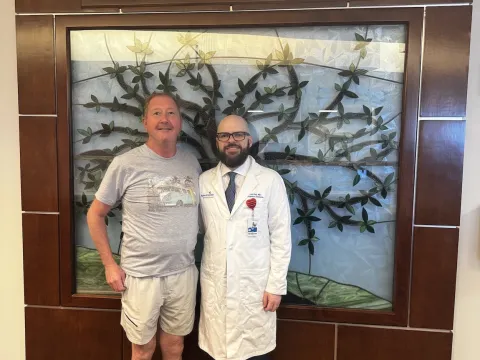- AdventHealth
Collaborative Research Study Published in Transplantation and Cellular Therapy
Sarfraz Ahmad
Rushang D. Patel
Juan Carlos Varela
Shahram Mori
Blood and Marrow Transplant Program
AdventHealth Cancer Institute
James Yu1, Yuan Du2, Sarfraz Ahmad3, Rushang D. Patel4, Juan Carlos Varela4, Chung-Che Chang5, Shahram Mori4
1Department of Internal Medicine, 2Research Institute, 3Gynecologic Oncology Program, 4Blood and Marrow Transplant Center, 5Department of Pathology and Laboratory Medicine, AdventHealth Hospital, AdventHealth Cancer Institute, Orlando, FL 32804
Summary
The ideal conditioning intensity in allogeneic hematopoietic stem cell transplantation (HSCT) is evolving. Previous prospective studies comparing myeloablative conditioning (MAC) versus reduced-intensity conditioning (RIC) regimens in adults with acute myelogenous leukemia (AML) have shown mixed results. In many of these studies, patients were not stratified based on measurable residual disease (MRD).
We evaluated the effect of conditioning intensity on the outcomes of AML patients in complete remission (CR) with flow cytometry evidence of MRD negativity. A total of 135 patients age 20 to 75 years with AML in CR1 or CR2 and flow cytometry evidence of MRD negativity who underwent allogeneic HSCT at our center between 2011 and 2019 were evaluated. We compared overall survival (OS), relapse-free survival (RFS), non-relapse mortality (NRM), relapse, and acute and chronic graft-versus-host disease (GVHD) in recipients of MAC (n=89) and RIC (n=46).
Although the patients receiving RIC were older (62 versus 51 years; p<0.0001), there were no statistically significant differences between the groups in terms of Eastern Cooperative Oncology Group and European Leukemia Network risk criteria and disease status (CR1 or CR2) at the time of transplantation. At a median follow-up of 24.6 months, no statistically significant differences in OS (hazard ratio [HR], 0.78; 95% confidence interval [CI] 0.42 to 1.42, p=0.411) or RFS (HR, 1.004; 95% CI, 0.48 to 2.09, p=0.99) were identified. The cumulative incidence of NRM (HR, 0.595; 95% CI, 0.24 to 1.48; p=0.2644) and relapse (HR, 1.007; 95% CI, 0.45 to 2.23; p=0.9872) was not different between the 2 groups. Grade II-IV and grade III-IV acute GVHD were more frequent in the MAC group (39.3% versus 19.9% [p=0.018] and 19.3% versus 2.3% [p<0.001], respectively), as was moderate/severe chronic GVHD (23.6% versus 15.8%; p=0.038).
Our data indicate that conditioning intensity did not appear to affect OS, RFS, NRM, and relapse risk in patients with MRD-negative AML as measured by flow cytometry. RIC resulted in less severe acute and chronic GVHD.
Highlights
- The ideal conditioning intensity in allogeneic HSCT in patients with MRD negativity is evolving.
- At a median follow-up of 24 months, no significant differences in OS and RFS were noted between patients receiving MAC and those receiving RIC with flow cytometry evidence of MRD negativity.
- The rates of grade III-IV acute GVHD and moderate/severe chronic GVHD were higher in the MAC group compared with the RIC group.
- RIC may be an option in younger patients without evidence of MRD, although further prospective randomized trials with longer follow-up will be needed to confirm our findings.
For more information or to refer a patient, call one of our Bone Marrow Transplant Nurse Navigators: Austin Carroll, BSN, RN; Anna Cullivan, BSN, RN; Vielka Hernandez, RN; or Heather Brown, RN, at Call407-303-2825.
Link to Article: https://www.astctjournal.org/article/S2666-6367(21)00864-2/pdf
Recent News

AdventHealth Cancer Institute Advances the Use of CAR T-Cell Therapy for Multiple Myeloma
CAR-T therapies have emerged as new treatment options for certain types of cancer through a one-time infusion that can lead to long-lasting remission.

New Clinical Trial Explores Digital Intervention for Apathy in Late-life Depression
Afflicting 30-50% of patients with late-life depression, apathy is a challenging psychiatric syndrome in older adulthood that can result in lack of motivation leading to poor self-care, physical...

AdventHealth Performs Central Florida’s First Liver Transplant for Unresectable Colorectal Liver Metastases
In June 2025, AdventHealth Abdominal Transplant Surgeon and Surgical Oncologist Ryan Day, MD, worked with a multidisciplinary team to perform Central Florida’s first liver transplant for unresectable...

AdventHealth Neuroscience Institute First in Florida to be Recognized as a GammaTile Center of Excellence
GammaTile is the first and only tile-based radiation therapy for the treatment of
operable brain tumors. The AdventHealth Neuroscience Institute began performing GammaTile procedures in 2021 and was...

An AdventHealth Collaboration Explores the Impact of Microgravity and Electrical Stimulation on Muscle Cell Health in Space
Using a muscle lab-on-chip model aboard the International Space Station (ISS), AdventHealth Translational Research Institute’s Dr. Paul Coen has been working with a multidisciplinary team from the...

AdventHealth Neuroscience Institute Among First in U.S. to Offer Phase IIa Clinical Trial of Troculeucel for Moderate Alzheimer’s Disease
While most clinical trials for Alzheimer’s disease have focused on patients with early or mild cognitive impairment, roughly 30% of those with Alzheimer’s have moderate stage disease for which there...

AdventHealth Translational Research Institute Selected as Clinical Site for National Study of Muscle, Mobility and Aging (SOMMA)
Under the leadership of Scientific Director and Principal Investigator Bret H. Goodpaster, PhD, the AdventHealth Translational Research Institute (TRI) is now enrolling men and women 70 years of age...

AdventHealth Neuroscience Institute Administers First Dose of Investigative NK Cell Therapy to Person with Alzheimer’s Disease
Under a single compassionate use Investigational New Drug (IND) authorization cleared by the U.S. Food and Drug Administration (FDA), the AdventHealth Neuroscience Institute worked with NKGen Biotech...

AdventHealth Study Exploring the Use of MR-Guided Focused Ultrasound (MRgFUS) to Disrupt the Blood-Brain Barrier for Treatment of Alzheimer’s Disease
Under the leadership of Dr. Valeria Baldivieso and Dr. Chandan Reddy, the AdventHealth Research Institute is the first and only site in Orlando offering the Exablate Blood-Brain Barrier (BBB)...

AdventHealth Research Institute Offers Phase II Clinical Trial of Etanercept for Treatment of Blast-Induced Tinnitus
Approximately 1 billion people throughout the world suffer from tinnitus (ringing in the ears), and it is the number one disability of those who serve in the U.S. military. The condition can disrupt...

AdventHealth Research Institute and NESTRE Health & Performance Announce Collaboration to Advance Neurocognitive Health and Performance Through Cognitive Training
With an aging population and increases in the prevalence of neurological conditions like Alzheimer’s disease and dementia, physicians and patients alike continue to seek new tools and approaches to...

AdventHealth Among First in U.S. to Offer IDP023-2-101 Clinical Trial for Patients with Progressive Multiple Sclerosis
The AdventHealth Neuroscience Institute is the first in Florida and one of the first in the country to begin recruiting patients with primary progressive or non-active secondary progressive multiple...
